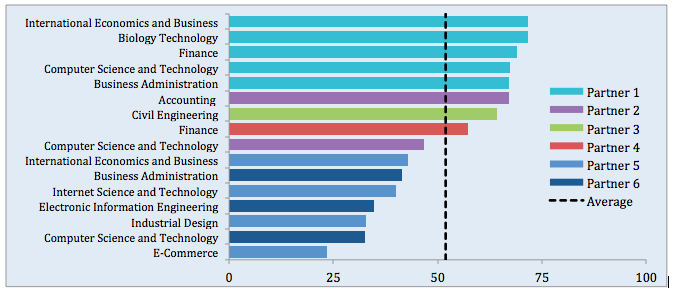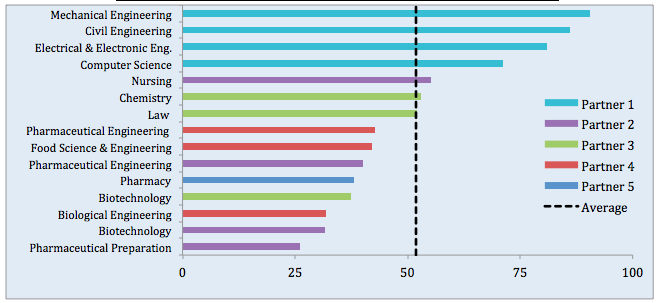“If the US is to continue to innovate, develop and flourish, it needs to not only recruit the brightest and best, but also the bold and the brave”
Adrian Mutton, Founder & CEO of Sannam S4, a company providing market entry and ongoing support services to international universities and skills providers in India, Brazil and China, writes about the recent US India CEO Forum and Business Summit that demonstrated an unprecedented willingness for collaboration in HE.
 When new Indian Prime Minister Narendra Modi visited the US in September 2014, he received a rock star welcome. He was greeted by a full house of adoring fans at Madison Square Gardens in New York and President Barack Obama gave the Indian Prime Minister two days of his time to talk about building better US-India ties and to personally show him around Washington, DC.
When new Indian Prime Minister Narendra Modi visited the US in September 2014, he received a rock star welcome. He was greeted by a full house of adoring fans at Madison Square Gardens in New York and President Barack Obama gave the Indian Prime Minister two days of his time to talk about building better US-India ties and to personally show him around Washington, DC.
To return the compliment, President Obama was invited as chief guest to India’s Republic Day celebrations on January 26th.
Arriving into New Delhi on Air Force One, as the President stepped off his plane onto the tarmac, he was greeted by Narendra Modi with a bear hug.
“The gesture, broadcast around the world, was a clear affirmation that the two leaders have developed a special personal relationship in a very short space of time”
The gesture, broadcast around the world, was a clear affirmation that the two leaders have developed a special personal relationship in a very short space of time. During the two day visit by President Obama, a nation of 1.3 billion people was gripped with the coverage of his every move, suggesting India’s population has also taken to the US President.
The key agenda points tabled for discussion included nuclear collaboration, climate change, increasing trade flows, visas and IPR protection. Leading up to the visit, a number of HE and skills related topics had also been promoted to both the White House and India’s Ministry for External Affairs (MEA) for discussion.
I was fortunate to have been invited to not only participate in the high level US-India talks at a summit held in New Delhi, hosted by both President Obama and Prime Minister Modi, but I was also delighted to have been asked to provide direct input into President Obama’s briefing. Inputs which were included in his final discussion points with Prime Minister Modi and senior US and Indian business leaders and officials, I later learnt.
My inputs were focused on explaining the type of support US universities, skills providers and mid market companies needed to succeed in India. I highlighted the need for a strong platform which dealt with the red tape, bureaucracy, compliance and tax issues faced by organisations when entering India. I highlighted challenges in recruiting good staff, establishing offices and knowing who to collaborate with locally and how to build sustainable partnerships – and, of course, raised the issue of the many “grey areas” around dual programs, tax on local activities and the now rather stale issues surrounding the foreign education providers bill.
“I highlighted the need for a strong platform which dealt with the red tape, bureaucracy, compliance and tax issues faced by organisations when entering India”
Drawing on case studies of institutions we proudly support at Sannam S4 in India, including the University of Bridgeport, University of South Florida, DeVry and MIT to name a few, I set out the vast opportunities these institutions faced and then detailed the specific challenges that hindered their progress.
Presenting Sannam S4’s LaunchPad model as an example, I explained how a strong local supportive environment can help US universities and skills providers flourish.
The US has made good strides of late with its visa policy and the processing of student applications. Unlike some other countries (no names needed!) recruiting Indian students, the PR surrounding studying in the US is positive and as a result its number of applicants is on the rise. The US recognises that Silicon Valley has been built on the brains of Indian students, the engineers across the US are from towns and villages across the subcontinent and that if the US is to continue to innovate, develop and flourish… and own the intellectual property and the rewards that go with it, it needs to not only recruit the brightest and best, but also the bold and the brave.
The US is not just seeking Indian students to become lawyers and bankers, accountants and actuaries, it is seeking to attract entrepreneurs, innovators and risk takers. This is a clear distinction between the US approach to student recruitment and policies adopted by election sound byte focused politicians from other countries.
“The US recognises that Silicon Valley has been built on the brains of Indian students”
The US has recognised that it is also not just student recruitment that is important to help foster long term ties between the two countries. The US India Educational Foundation (USIEF) in New Delhi, for example, led by its impressive and long term Executive President Adam Grotsky, who has decades of experience in India and a deep understanding of the culture and what makes for strong and sustainable ties between the US and India, is doing a sterling job on educational exchanges of scholars, professionals and students. USIEF has awarded approximately 17,000 Fulbright, Fulbright-Nehru, and other prestigious grants and scholarships in almost every academic discipline to promote long term bilateral ties.
The US administration has been working hard on supporting skills development programmes in India with its community colleges and is leveraging the funds available from the Indian government’s corporate CSR ruling to contribute towards new regional training initiatives.
The increasingly influential US India Business Council (www.usibc.com) has a dedicated education and skills group which is fostering bilateral institutional relationships, particularly those with a commercial interest. With its incoming President Dr. Mukesh Aghi having a particular passion for educational ties between the two countries, I expect to see the USIBC’s focus in this area strengthen.
So after all the razzmatazz of President Obama’s visit, what was achieved on the higher education and skills development front?
Frankly, despite the excitement, the visit was unfortunately short of news grabbing headlines for the sector.
“Despite the excitement, the visit was unfortunately short of news grabbing headlines for the sector”
An exception was confirmation by President Obama that the US is to send 1,000 academics a year to India, something which had been discussed during Prime Minister Modi’s visit to the States last year and is not an insignificant initiative.
The central government sponsored Global Initiative of Academic Networks (GIAN)
aims to give Indian students and academics access to 1,000 US faculty per year, to broaden their horizons, exchange ideas and teaching methods and foster new research collaboration and partnerships.
There was no shock announcement regarding the Higher Education Provider Bill (despite some advanced lobbying during Secretary John Kerry’s visit to India earlier in the month), so no foreign owned campuses for now. There was no public discussion regarding India’s powerful University Grants Commission (UGC) and how it governs international partnerships, so nobody in the sector missed anything by not being tuned into the visit.
What was clear, however, was that the visit encouraged an unprecedented willingness for collaboration between the two administrations. A number of key initiatives have been tabled, several of which are taken from Sannam S4’s own contributions, which will now be pursued and monitored over the weeks and months ahead, so despite the lack of headlines, I am positive about what this visit will achieve mid to longer term.
“The visit encouraged an unprecedented willingness for collaboration between the two administrations”
The future of US-India ties for universities and skills providers has strong support from the highest level of both governments. It has the enthusiasm of Indian students, scholars and business leaders and a focus from the Indian administration on addressing red tape and the complexities of operating in the market. Institutions in the US will have no doubt seen the coverage of the visit at home, reminding them of India’s vast potential.
A touch of realism and pragmatism is still needed of course, but I came away from the visit, truly believing that the stage has been set for a new era of US-India collaboration. For many India has been a frustrating market (particularly when compared to China), fraught with the challenges I have highlighted above. However, I expect to see many exciting opportunities develop over the months and years ahead, which, if well supported in India, will bear rich fruits. The bold and the brave, both institutions and students, will likely be rewarded.

 When new Indian Prime Minister Narendra Modi visited the US in September 2014, he received a rock star welcome. He was greeted by a full house of adoring fans at Madison Square Gardens in New York and President Barack Obama gave the Indian Prime Minister two days of his time to talk about building better US-India ties and to personally show him around Washington, DC.
When new Indian Prime Minister Narendra Modi visited the US in September 2014, he received a rock star welcome. He was greeted by a full house of adoring fans at Madison Square Gardens in New York and President Barack Obama gave the Indian Prime Minister two days of his time to talk about building better US-India ties and to personally show him around Washington, DC.


